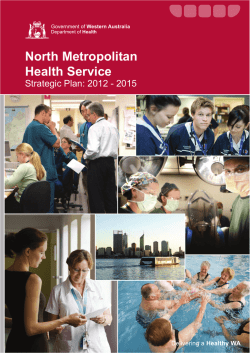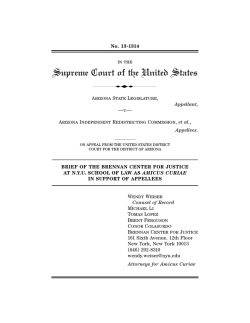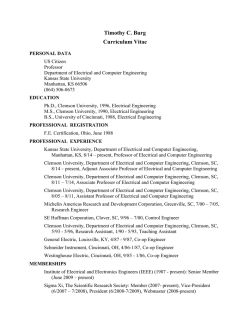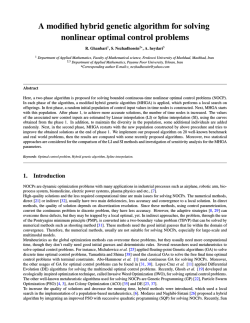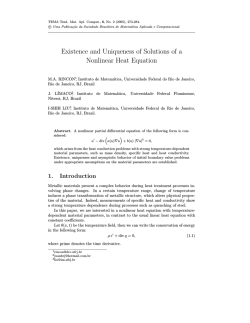
Program Schedule
Sessions will be in the Multipurpose Room, 5B-16 (Except, Feb12: 8:30 – 1:00; in Theatre.) Dawson College Social Science Week February 9th to 13th, 2015 Monday, February 9th 8:30 am Take Two! - Hollywood and Historical Movies Isabelle Carrier and Lisa Steffen, Dawson - History Movies are useful tools for the purpose of learning history. They serve to extend learning beyond the textbook and help us get the “feel” for an era by connecting concepts with visual representations. The two presenters on this panel will share various strategies for using movies to learn about the past. Topics covered include: how movie scenes can provide an impression of daily life in a particular era, the use of popular historical fiction to build on acquired knowledge, and how movies produced during a certain era (1950s) are seen as echoing and in turn shaping cultural trends. The validity of films can be also evaluated. . 10:00 am Buddha Bikinis and Ganesha Tattoos: The Western Appropriation of Eastern Religious Symbols Lawrence Nixon and Johanne Rabbat, Dawson - Religion We are presently living in an era with unprecedented access to a variety of religious beliefs and practices from all over the planet. Eastern religious traditions have now truly circled the globe, as Hindu and Buddhist imagery has become part of our very own Western frame of reference. This appropriation of Eastern religious symbols by Western culture not only raises problematic issues with regards to the use of Eastern sacred imagery, but also gives rise to a number of questions regarding the appropriation or importation of symbols from foreign lands to cultures that do not share the same beliefs and values. This talk will focus on a few such instances where the East and the West collide. 11:30 am Well-being, Forever, For All… Chris Adam, and environmental leadership CRLT students - Dawson What happens when students discover that their happiness and well-being are intertwined with the happiness and well-being of other people and the natural environment? What happens when students are asked to present what they are grateful for after a course or what connections they have made between their lives and a course? This session will explore how an intensive outdoor experience inspired a group of Dawson students to reflect on Sustainable Happiness: happiness that contributes to individual, community and/global well-being without exploiting other people, the environment or future generations (O’Brien, C.). Monday, February 9th afternoon 1:00 pm If It Looks Like a Duck, Swims Like a Duck, and Quacks Like a Duck, Is It a Duck?: Bride Abduction and the Importance of Context in Anthropological Research Kate Rice, Anthropologist, University of Toronto Kate Rice spent a year and a half conducting fieldwork in rural South Africa studying a wide range of topics including (but not limited to): gender, generation, HIV/Aids, marriage practices/patterns and more. Using the example of bride abduction, a central topic in her PhD dissertation, Kate Rice will discuss research methods used in anthropology and the importance of avoiding ethnocentrism when conducting anthropological research. 2:30 pm Understanding Eating Disorders: Anorexia, Bulimia and Binge Eating Jodie Richardson, Psychologist and Co-founder of CHANGE, Cognitive Behavioural Psychology Clinic We hear talk of eating disorders in the media and all around us, but there is still much misconception about what it means to suffer from an eating disorder. This talk will help you understand what causes some people to be at risk and how to recognize the signs and symptoms of eating disorders. We will discuss what is involved in the treatment of an eating disorder, how to best intervene with a friend or loved one suffering from such a disorder and how you can contribute to the prevention of eating disorders. 4:00 pm Challenges and Realities Facing Aboriginal Women Widia Larivière, Youth Coordinator, Québec Native Women - Femmes Autochtones du Québec Founded in 1974, Quebec Native Women defends the interests of First Nations women in Quebec and Aboriginal women living in urban areas. We support Aboriginal women in their efforts to better their living conditions through the promotion of non-violence, justice, health and equality. We also empower women in their commitment to their communities. This session will allow participants to get an overview of the challenges and realities facing Aboriginal women, as well as the initiatives and campaigns led by the organization. This will be followed by a discussion on the ways to support the organization and the mobilizations of Aboriginal women. Tuesday, February 10th 8:30 am Behind Closed Doors - The Effects of Domestic Violence on Children Abe Worenklein, Dawson - Psychology When one considers what children need in order to develop their full potential, we know that children require a home in which they feel safe and secure and in which they are protected by their parents from violence directed at them or violence that is witnessed by them. One recognizes that there are risk and protective factors that can hinder or that can promote a child's development. One of the greatest risk factors for children to becoming "at risk" is the presence of domestic violence within the home. The presentation will demonstrate how domestic violence affects children/adolescents at the different stages of development. 10:00 am Monetary Policy in Canada and the Impact of Lower Oil Prices on the Canadian Economy Lise Pichette, Senior Regional Representative (Economics), Bank of Canada Lise Pichette will present the objectives of Canadian monetary policy and explain how the policy works in practice. She will review the Bank’s most recent monetary policy decision and present how the Bank sees the economy evolving over the next few quarters, considering the risks that surround this outlook. She will focus on the impact of the recent oil price shock on the Canadian economy and identify the main channels through which movements in commodity prices affect our economy. What are the sectors or regions that will be adversely affected? Who will benefit? 11:30 am Clearing the Air: Environmentalism for the Non-Environmentalist Geoffrey Pearce, Dawson - Geography The term ‘environmentalism’ has been associated with so many issues, opinions, and ideologies that it has, understandably, become confusing for many. Quite often, it is assumed that environmentalism is synonymous with pessimism, self-righteousness, and negativity. I hope to clear the air by outlining the sensible ‘bottom-line’ concerns that are the basis of environmentalism. Once I have argued for the legitimacy of these concerns I will show that making environmentally conscious decisions does not require severe personal sacrifice, alienating oneself from friends and family, or adopting a certain political ideology. Although environmental consciousness requires a critical perspective, I will show that it can also be consistent with sound personal finance, healthy lifestyle choices, and respect for friends, family, and community. Tuesday, February 10th afternoon 1:00 pm Developing Democracy in Ukraine and Moldova : Elections and the Role of International Observers Helen Fotopulos, International Election Observer and former Municipal politician Since the break-up of the Soviet Union, elections in the former Soviet republics have either embraced the liberal democratic process or have simply adopted the veneer of the liberal democratic process. The veneer of the liberal democratic process has as its characteristic an election involving competing autonomous political parties. But the outcomes of such elections are undermined by corruption and nepotism, and the curtailment of liberal principles of free expression and the right to fair elections. Canada has played an important role in the democratic development of the post-soviet space since 1991, and numerous Canadian election observation missions have contributed significantly to this tradition. In the past year, Canada deployed two large missions to observe the early presidential elections and the early parliamentary elections in Ukraine and sent a delegation for the recent parliamentary elections in Moldova. The speaker will focus on her role as an international observer of elections in the Ukraine and Moldova. 2.30 pm Jerusalem 3D -IMAX, The Film Daniel Ferguson, Director, Writer, Producer As part of S.P.A.C.E. Trans- theme, Daniel Ferguson will discuss his award winning film, Jerusalem 3D (filmed for IMAX and distributed by National Geographic), that sought to show the diversity of Jerusalem and to promote understanding of the different cultures through the eyes of three teenagers: a Jew, Christian and Muslim. Ferguson will address some of the issues discussed by his advisory board of academics, theological experts and an archaeologist as well as talk about some interesting filming of aerial shots of areas normally treated as no-fly zones that permit us to better understand one the world’s most famous cities. 4:00 pm Income Inequality: What is all the Fuss About? Worku Aberra, Dawson - Economics Income inequality in Canada, the US, and other countries has been rising over the last three decades. The lecture, inspired by Thomas Picketty’s book, Capital in the Twenty-First Century, discusses the causes and consequences of the rise in income inequality in Canada. The metrics used to assess income inequality will be reviewed. Using some of these indicators, it will be shown that the major source of income inequality in Canada, as elsewhere, has been the differences in employment income, especially the difference between the high and rising salaries of managers and chief executive officers of companies and the low and stagnant income of ordinary Canadians. To illustrate the gap in income inequality in Canada today, the salaries of the 10 highest paid Canadian executives will be compared with the average income of Canadians. The main economic theory of income determination that is often used to explain income inequality—marginal productivity and its variant modifications— will be presented, and its weaknesses pointed out. In conclusion, the possible measures available to policy makers to mitigate income inequality will be examined. Wednesday, February 11th 8:30 am Why Does Violence Persist In New Democracies? Daniel Douek, Political Science, Concordia University Several countries in Central America and Southern Africa fought bitter civil wars at the end of the Cold War era, and then resolved their conflicts and held democratic elections after the Cold War ended. Yet high levels of violent crime persist in some of these countries, while others have become more peaceful. What explains these different outcomes? This talk will examine the democratic changes in Nicaragua, Guatemala, and South Africa, and explain why violence remains widespread in South Africa and Guatemala, while Nicaragua has become much safer. 10:00 am Reconciling the Two Solitudes: Aboriginal and non-Aboriginal Canadians Marie Wilson, Commissioner, Truth and Reconciliation Commission of Canada Dawson’s Inspire Solutions and First Peoples Initiative are honoured to host Dr Marie Wilson, Commissioner for Canada’s Truth and Reconciliation Commission. Dr. Wilson will discuss the enormity of the task faced by the commission in its effort to record the suffering of those affected by Canada’s residential school system and guide a process of reconciliation among and within Aboriginal families, communities, churches, governments, and Canadians. She will explain the damaging legacy of residential schools on Aboriginal Canadians and express how imperative the deeper engagement of non-Aboriginal Canadians remains if meaningful reconciliation is to be achieved. "We must be honest about the real two solitudes in this country, that between Indigenous and non-Indigenous citizens, and commit to doing tangible things to close the divide in awareness, understanding and relationships.” Wednesday, February 11th afternoon 12:00pm Dawson Oral History Project Isabella Byrne, Jasmine Jalali-Kamaie, Matthew Wightman, Dawson - Students Since 2012, Research Methods students at Dawson College have conducted oral history interviews with over 700 Montreal residents. Each student who records an interview with a member of their community is engaged in doing original research, complicating and expanding existing bodies of knowledge regarding the meaning and experience of historical events. Last fall, the Dawson Oral History Project was incorporated into a section of the Integrative Seminar and a section of Advanced History. The students of these courses used previously recorded oral histories, and recorded some new ones, in order to learn from and value the extraordinary life experiences of ordinary Montrealers. Some of the students who participated in these sections will present their research and talk about some of the challenges and benefits of using oral history narratives as primary sources for research in the social sciences. Wednesday, February 11th afternoon 2:30 to 5:30 Special Event This special event will include numerous student posters on themes such as religious diversity, social psychology, development and underdevelopment, and more. There will be displays prepared by different profiles in the social science program, and various certificates open to students across programs. As well there will be information and displays by groups involved in college-wide activities. 2:30 pm to 3:45 Workshop University 101– Room TBA Antonina Nobile and Ivana Bonaduce, Dawson, Academic Advisors Do you have questions about applying to university? Do you know the meaning of a minor, major, specialization or honours in a university program? Are you wondering about the benefits of attending a certain university in Montreal? This session will answer these questions and more. Thursday, February 12th 8:30 am ROOM : Theatre Data to Make a Difference Amelie Gagnon, UNESCO Institute for Statistics We live in a world of data. Every time you update your status, tweet or Google something, you are generating data that companies use to learn about you and target advertising. The data is finding new audiences thanks to the open data movement, and new tools available for visualizing statistics, and a new breed of data practitioner is entering the mainstream (data scientist, data journalist, data visualization designer) -- using tools to unlock data from spreadsheets and make it visual and explorable. Data can also be used to make the world a better place. There are several examples of organizations doing this in the humanitarian field. The UNESCO Institute for Statistics collects data on education, which is considered a basic human right. Did you know that nearly 60 million children are not in school? Most of them are girls. Whether you are interested in the common good, in coding or simply geek-curious, this session will literally show you how data can be used for advocacy, policymaking, and research. 10:00 am ROOM : Theatre Ecological Citizenship: from One Dollar, One Vote, to One Tree, One Vote Kartik Sameer Madiraju, New York University, J.D. Candidate, Conflict Resolution Coach, Environmental Justice Advocate It is not the debilitating consequences of climate change, but the paralysis of its immensity that is the true enemy of environmentalism. Starting from the irrefutable premise that it is our generation that must bridge the painful rift between society and ecology, this presentation aims to achieve three goals. First, to explain what environmentalism’s highest ambition should be. Second, to examine where the individual, and communities, fit within the solution. And finally, to challenge students and faculty alike to walk the difficult and rewarding path to ecological balance, and environmental justice. 11:30 am ROOM : Theatre Some Things Cannot Be Said: Wittgenstien, WWI & "All Quiet on the Western Front" Derrick Farnham, Dawson - Philosophy Ludwig Wittgenstein’s philosophy is notoriously difficult to understand, and even more difficult to explain. This is especially the case with his doctrine that some things cannot be said. This difficulty can be eased by attending to the circumstances in which his book, "Tractatus LogicoPhilosophicus", was written, the First World War. Wittgenstein conceived the topic as a student at Cambridge, wrote the book on the battlefield and polished it in a prison camp. His war time experience reared his philosophy. One of the best accounts of a soldier’s experience in World War One is Erich Maria Remarque’s book "All Quiet on the Western Front". By looking at Remarque’s account we can understand Wittgenstein’s experience which shaped his philosophy. This lecture will use Remarque’s account to make sense of Wittgenstein’s claim regarding what cannot be said. In the end it will be shown that, like the soldiers who came back from World War One, “Whereof one cannot speak, thereof one must be silent.” (Tractatus, 7) Thursday, February 12th afternoon 1:00 pm On Values, Choices and Environmental Degradation Jean Duclos Alegue Fuego, Dawson - Economics Environmental degradation is a result of the choices made by each of us and the society as a whole. Individuals and society have things they want and need, and try to obtain them using the limited resources they possess. In this quest, natural resources are used and goods are produced, entrepreneurs identify opportunities and profit is made, jobs are created and the economy grows, etc. Unfortunately, the process hardly takes into account the degradation of the environment and the loss of services provided by the ecosystem. This presentation will clearly show that the choices we make on a daily basis directly and indirectly contribute to the environmental challenges presently facing the world. These choices are the result of the values of our society. The presentation will present the different ecosystem services lost, how to place an economic value on them and take them into consideration in our decision making processes. Given that students are the future decision makers and entrepreneurs of tomorrow, the presentation will propose how to become green students and citizens in order to change the current trend of environmental degradation. 2:30 pm UN Refugee Agency: Mandate and its Challenges Denise Otis, Legal Officer for the United Nations High Commissioner for Refugees (UNHCR) Denise Otis, legal officer for the UNHCR, will describe the work of the UNHCR both in Canada and internationally. She will provide an overview of the asylum procedure in Canada and key issues for persons facing forced migration in the world of today. 4:00 pm How Can We Better Include First Nations, Inuit and Métis People in the Canadian Family? Guy Freedman, Executive Director, Canadians For a New Partnership Chloe Ferguson, Speechwriter & Executive Assistant for The Right Honourable Paul Martin Canadians for a New Partnership is built on the principle that Indigenous peoples in Canada and Canadians can together build a strong economy and values-based society that will benefit present and future generations. It is a principle shared by a growing number of other Canadians from all walks of life, including churches, businesses, academia and the public service. Join CFNP’s Executive Director Guy Freedman and Chloe Ferguson, Executive Assistant to the Rt. Hon. Paul Martin – a CFNP Board Member - to learn about the Partnership and more importantly, present your thoughts on how we can better include First Nations, Inuit and Métis people in the Canadian family. The overriding mission is to build a better and stronger Canada, and many are signing their name to a declaration, pledging to do so. If it feels right to you, please consider signing the Declaration online at cfnp.ca after this event. Friday, February 13th 8:30 am Human Trafficking in Québec: Implications of the new Federal Bill C-36 Lynn Dion, Batshaw Youth and Family Services, Emanuel Joncas, the project Dialogue, a YMCA International Initiative, Bill C-36 maintains that the best way to avoid prostitution’s harms is to bring an end to its practice. How does it apply to cases of human trafficking in Québec? Since its implementation, some have raised concerns that the Nordic Model would drive prostitution underground, make human trafficking more difficult to detect and impact the safety and well-being of vulnerable women. The session will provide a comprehensive overview, and discuss some important legal and social implications. 10:00 am Last week, did you have a job ? Gwénaël Cartier, Regional Advisor for Statistics Canada’s Eastern Region Every month, Statistics Canada is required to conduct the Labour Force Survey (LFS). The LFS provides estimates of employment and unemployment which are among the most timely and important measures of performance of the Canadian economy. With the release of the survey results only 13 days after the completion of data collection, the LFS estimates are the first of the major monthly economic data series to be released. LFS data are used to produce unemployment rates, as well as other standard labour market indicators such as employment rates and participation rates. The LFS also provides employment estimates by industry, occupation, public and private sector, hours worked and much more, all cross-classifiable by a variety of demographic characteristics. Estimates are produced for Canada, the provinces, the territories and a large number of subprovincial regions. 11:30 am Ten Months on a Bike - Cycling Across Asia Émilie Richer & Yann Lamontagne – Dawson - Mathematics Émilie and Yann spent ten months cycling over 10,000km from Istanbul to Singapore. With many photos to share, they will discuss some of the more unique experiences of their journey, and the challenges that they faced while on the road. The talk will touch on how travel can change the way one sees their role in society. Friday, February 13th afternoon 1:00 pm Economic Challenges and Opportunities for Minorities and Immigrants in America Andrew Zvirzdin , Political/Economic Officer, U.S. Consulate General Montreal The American dream—the concept that with hard work and good ideas you can succeed in life—has been at the bedrock of the national ethos of the United States since its founding. As a country, the United Stories has sought to establish political and economic conditions that reward innovation and ingenuity. But its legacy of slavery, the challenges of racism, and prejudice have at times clouded this dream for many. Today, the United States continues to wrestle with the challenges of keeping the American dream alive for all of its citizens. This presentation will provide a brief historical review of economic conditions for minorities and immigrants in the United States and discuss what steps the United States is pursuing to ensure greater economic opportunity for all. 2:30 pm Closure -‐ Refreshments
© Copyright 2026
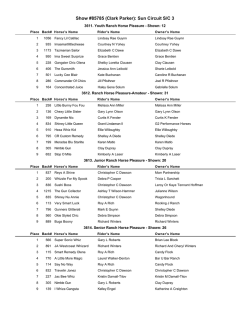
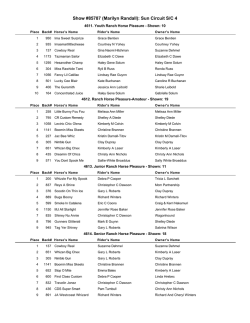
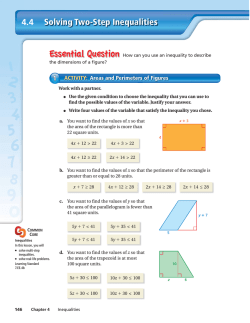
![Flyer on the event [PDF]](http://s2.esdocs.com/store/data/000461133_1-4d88ad04a2122eb11dffd05a58c0a0a8-250x500.png)
